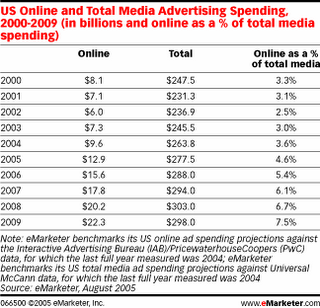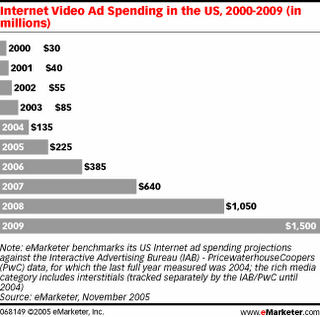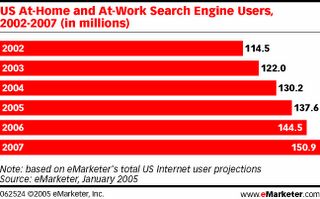JANUARY 11, 2006
January is here again and with it comes the usual slew of projections and forecasts for the coming year. Not to be left out, eMarketer joins the fray.
Here's what to look for in 2006:
1. Online Advertising Passes the 5% Mark
5.4% of all US advertising spending will be devoted to the online channel in 2006. This is the first time the figure has exceeded 5%. The Internet's share of advertising spending will be greater than that of the yellow pages. In fact, some of the money going online comes from the yellow pages, as certain Web sites replicate its functions.
By 2009, despite a fall in total ad spending, Internet ad spending will rise to over $22 billion. This will represent 7.5% of all advertising spending, and be greater than radio's 7.3% share of the market in 2005.

2. Retail E-Commerce Grows (Even More)
US online retail sales will grow from $87 billion in 2005 to $105 billion in 2006, a healthy 21% increase. More spending by affluent baby boomers and the rising buying power of Web-savvy young consumers, coupled with the spread of high speed broadband Internet access, are the key factors that will drive retail e-commerce sales to new heights.
3. Broadband Continues to Spread
The US broadband market reached an important inflection point in late 2004 and early 2005 when the number of broadband Internet users overtook dial-up users for the first time. eMarketer estimates that there are now over 105 million broadband users in the US. This will rise to over 124 million in 2006 and will exceed 157 million in 2008.
Rising broadband penetration is contributing to e-commerce growth, helping transform the Web into a truly multimedia environment and making new Internet services such as VoIP telephony a reality. The implications and opportunities for online advertising and marketing are extensive.

4. Online Video Thrives
Online video distribution and consumption will grow significantly in 2006. The Internet is increasingly seen by consumers as an entertainment platform, helped by increased broadband penetration and the adoption of improved digital rights management (DRM) technologies by content providers. The trend is also reinforced by supply-side moves such as increasingly sophisticated video search services from Google and Yahoo! and Apple's drive to distribute video content through iTunes.
Opportunities for video-based online advertising will rise on the back of this trend. US spending on Internet video advertising will increase by a stunning 71% in 2006, to reach $385 million. 2007 is likely to see similar growth.

5. Video on Phones Comes to Life
The rise of the very small screen will start in 2006. It is difficult to gauge exactly how many mobile TV subscribers there are, since none of the wireless operators is sharing numbers. But based on the data that is available, eMarketer estimates that in 2005 there were 1.2 million US consumers who watched TV programming on their mobile phone (either live programs or pre-recorded video). This number will more than double in 2006 to 3 million phone users. By 2009, there will be 15 million phone video viewers, an estimated 6.2% of total mobile phone subscribers.

6. Search Engine Portals Expand Their Reach (Even Further)
About one half of all US Internet users visit Yahoo! every month. Globally, the "Big Four" portals (Yahoo!, Google, MSN and AOL) have an audience of close to 30% of all the world's Internet users. These astounding figures will not diminish in 2006. Content-hungry, broadband-connected Internet users will turn to these portals in increasing numbers.
At the same time, locked in competition over audience size, the search engine providers will deliver more — and increasingly powerful — ad-supported web applications. They will also enhance and push their local search capabilities. These efforts will help drive the total number of US search engine users up from 138 million in 2005 to 146 million in 2006. This 5% increase will be more than double the increase seen in the total number of US Internet users.

7. IP Telephony Enters the Mainstream
By 2006, a substantial migration to VoIP services will be underway in the US. The number of VoIP access lines will grow from an estimated 10 million in 2005 to just under 14.5 million in 2006. A significant transformation of the telecommunications industry is inevitable. Cable providers and established telecoms companies will go head-to-head in the battle for residential and business VoIP subscribers. eMarketer expects the cable operators to win market share at the expense of the telcos' traditional phone businesses.
Newcomers include dedicated VoIP providers such as Vonage and Skype, as well as the major search engines (AOL, MSN, Yahoo! and Google), who offer low-grade telephony via their instant messaging platforms. However, all of these still require that end-users have broadband Internet access, virtually all of which is supplied by the cable companies and telcos.
©2006 eMarketer Inc. All rights reserved
Sem comentários:
Enviar um comentário